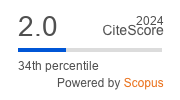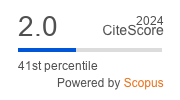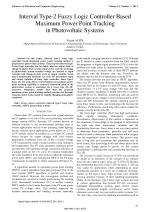| 3/2013 - 11 |
Interval Type-2 Fuzzy Logic Controller Based Maximum Power Point Tracking in Photovoltaic SystemsALTIN, N. |
| Extra paper information in |
| Click to see author's profile in |
| Download PDF |
Author keywords
Boost converter, interval type-2 fuzzy logic controller, MPPT, photovoltaic systems
References keywords
fuzzy(16), systems(15), type(9), photovoltaic(9), logic(8), system(6), electronics(6), power(5), industrial(4), grid(4)
Blue keywords are present in both the references section and the paper title.
About this article
Date of Publication: 2013-08-31
Volume 13, Issue 3, Year 2013, On page(s): 65 - 70
ISSN: 1582-7445, e-ISSN: 1844-7600
Digital Object Identifier: 10.4316/AECE.2013.03011
Web of Science Accession Number: 000326321600011
SCOPUS ID: 84884916465
Abstract
In this paper, interval type-2 fuzzy logic controller based maximum power point tracking method is proposed for photovoltaic systems. The proposed interval type-2 fuzzy logic controller has two inputs and one output. Rate of change in photovoltaic system output power and rate of change in photovoltaic system terminal voltage are selected as input variables and change in duty cycle as output variable. Seven type-2 membership functions are used for determined input and output variables of fuzzy logic controller. Since type-2 fuzzy sets are used, effect of uncertainties on maximum power point tracking capability is removed. Operation point of the photovoltaic system is controlled via a boost type DC-DC converter. Simulation results show that the proposed maximum power point tracking method provides fast dynamic response, and it is also useful for rapidly changing atmospheric conditions. |
| References | | | Cited By |
Web of Science® Times Cited: 31 [View]
View record in Web of Science® [View]
View Related Records® [View]
Updated 2 weeks, 5 days ago
SCOPUS® Times Cited: 42
View record in SCOPUS® [Free preview]
View citations in SCOPUS® [Free preview]
[1] Design and control of a stand-alone hybrid power system, Madaci, Bouthaina, Chenni, Rachid, Kurt, Erol, Hemsas, Kamel Eddine, International Journal of Hydrogen Energy, ISSN 0360-3199, Issue 29, Volume 41, 2016.
Digital Object Identifier: 10.1016/j.ijhydene.2016.01.117 [CrossRef]
[2] Z-source T-type inverter for renewable energy systems with proportional resonant controller, Ozdemir, Saban, International Journal of Hydrogen Energy, ISSN 0360-3199, Issue 29, Volume 41, 2016.
Digital Object Identifier: 10.1016/j.ijhydene.2016.01.140 [CrossRef]
[3] Design and Hardware Implementation Based on Hybrid Structure for MPPT of PV System Using an Interval Type-2 TSK Fuzzy Logic Controller, Kececioglu, O. Fatih, Gani, Ahmet, Sekkeli, Mustafa, Energies, ISSN 1996-1073, Issue 7, Volume 13, 2020.
Digital Object Identifier: 10.3390/en13071842 [CrossRef]
[4] Soft switching maximum power point tracker with resonant switch in PV system, Oncu, Selim, Nacar, Salih, International Journal of Hydrogen Energy, ISSN 0360-3199, Issue 29, Volume 41, 2016.
Digital Object Identifier: 10.1016/j.ijhydene.2016.01.088 [CrossRef]
[5] Critical factors affecting the photovoltaic characteristic and comparative study between two maximum power point tracking algorithms, Drissi, Hanen, Khediri, Jalel, Zaafrane, Wajdi, Braiek, Ezzedine Ben, International Journal of Hydrogen Energy, ISSN 0360-3199, Issue 13, Volume 42, 2017.
Digital Object Identifier: 10.1016/j.ijhydene.2016.09.193 [CrossRef]
[6] Control of three-level quadratic DC-DC boost converters for energy systems using various technique-based MPPT methods, Belhadj, Souheyb Mohammed, Meliani, Bouziane, Benbouhenni, Habib, Colak, Ilhami, Elbarbary, Z. M. S., Al-Gahtani, Saad F., Scientific Reports, ISSN 2045-2322, Issue 1, Volume 15, 2025.
Digital Object Identifier: 10.1038/s41598-025-99551-2 [CrossRef]
[7] Enhancement of grid-connected photovoltaic system using ANFIS-GA under different circumstances, Vafaei, Saeed, Rezvani, Alireza, Gandomkar, Majid, Izadbakhsh, Maziar, Frontiers in Energy, ISSN 2095-1701, Issue 3, Volume 9, 2015.
Digital Object Identifier: 10.1007/s11708-015-0362-x [CrossRef]
[8] Genetically Optimization of an Asymmetrical Fuzzy Logic Based Photovoltaic Maximum Power Point Tracking Controller, AL-GIZI, A., AL-CHLAIHAWI, S., LOUZAZNI, M., CRACIUNESCU, A., Advances in Electrical and Computer Engineering, ISSN 1582-7445, Issue 4, Volume 17, 2017.
Digital Object Identifier: 10.4316/AECE.2017.04009 [CrossRef] [Full text]
[9] Robust type 2 fuzzy logic control microgrid-connected photovoltaic system with battery energy storage through multi-functional voltage source inverter using direct power control, Maroua, Bouziane, Laid, Zarour, Benbouhenni, Habib, Fateh, Mehazzem, Debdouche, Naamane, Colak, Ilhami, Energy Reports, ISSN 2352-4847, Issue , 2024.
Digital Object Identifier: 10.1016/j.egyr.2024.02.047 [CrossRef]
[10] Review of Recent Type-2 Fuzzy Controller Applications, Tai, Kevin, El-Sayed, Abdul-Rahman, Biglarbegian, Mohammad, Gonzalez, Claudia, Castillo, Oscar, Mahmud, Shohel, Algorithms, ISSN 1999-4893, Issue 2, Volume 9, 2016.
Digital Object Identifier: 10.3390/a9020039 [CrossRef]
[11] Power System Topology Proposal of a High-Altitude Pseudo-Satellite: Sizing Method, Power Budget Modeling and Efficient Power Control, SEDDJAR, A., KERROUCHE, K. D. E., KHORCHEF, N., Advances in Electrical and Computer Engineering, ISSN 1582-7445, Issue 1, Volume 22, 2022.
Digital Object Identifier: 10.4316/AECE.2022.01006 [CrossRef] [Full text]
[12] Adaptive Interval Type-2 Fuzzy Tracking Control of PV Grid-Connected Inverters, Shadoul, Myada, Yousef, Hassan, Al Abri, Rashid, Al-Hinai, Amer, IEEE Access, ISSN 2169-3536, Issue , 2021.
Digital Object Identifier: 10.1109/ACCESS.2021.3114311 [CrossRef]
[13] Pulse density modulation controlled converter for PV systems, Oncu, Selim, Karafil, Akif, International Journal of Hydrogen Energy, ISSN 0360-3199, Issue 28, Volume 42, 2017.
Digital Object Identifier: 10.1016/j.ijhydene.2017.05.163 [CrossRef]
[14] Exploration of optimal design and performance of a hybrid wind-solar energy system, Bouzelata, Yahia, Altin, Necmi, Chenni, Rachid, Kurt, Erol, International Journal of Hydrogen Energy, ISSN 0360-3199, Issue 29, Volume 41, 2016.
Digital Object Identifier: 10.1016/j.ijhydene.2015.12.165 [CrossRef]
[15] Applications of Artificial Intelligence to Photovoltaic Systems: A Review, Mateo Romero, Héctor Felipe, González Rebollo, Miguel Ángel, Cardeñoso-Payo, Valentín, Alonso Gómez, Victor, Redondo Plaza, Alberto, Moyo, Ranganai Tawanda, Hernández-Callejo, Luis, Applied Sciences, ISSN 2076-3417, Issue 19, Volume 12, 2022.
Digital Object Identifier: 10.3390/app121910056 [CrossRef]
[16] Adaptive Fuzzy Approximation Control of PV Grid-Connected Inverters, Shadoul, Myada, Yousef, Hassan, Al Abri, Rashid, Al-Hinai, Amer, Energies, ISSN 1996-1073, Issue 4, Volume 14, 2021.
Digital Object Identifier: 10.3390/en14040942 [CrossRef]
[17] The Type-2 Fuzzy Logic Controller-Based Maximum Power Point Tracking Algorithm and the Quadratic Boost Converter for Pv System, Altin, Necmi, Journal of Electronic Materials, ISSN 0361-5235, Issue 8, Volume 47, 2018.
Digital Object Identifier: 10.1007/s11664-018-6312-8 [CrossRef]
[18] ANFIS Based Voltage Determination for Photovoltaic Systems According to the Specific Cell Parameters, and a Simulation for the Non-Isolated High Gain DC–DC Boost Converter Control Regard to Voltage Fluctuations, Selami Balci, , Kayabasi, Ahmet, Yildiz, Berat, Applied Solar Energy, ISSN 0003-701X, Issue 6, Volume 55, 2019.
Digital Object Identifier: 10.3103/S0003701X19060100 [CrossRef]
[19] A software tool for testing maximum power point tracking algorithms using real working conditions, Amrouche, Badia, Belhaouas, Nasreddine, Achachera, Soulef, Boukadoum, Mohamed Tahar, International Journal of Hydrogen Energy, ISSN 0360-3199, Issue 29, Volume 41, 2016.
Digital Object Identifier: 10.1016/j.ijhydene.2016.04.147 [CrossRef]
[20] Asymmetrical interval type-2 fuzzy logic control based MPPT tuning for PV system under partial shading condition, Verma, Pallavi, Garg, Rachana, Mahajan, Priya, ISA Transactions, ISSN 0019-0578, Issue , 2020.
Digital Object Identifier: 10.1016/j.isatra.2020.01.009 [CrossRef]
[21] Control of multi-level quadratic DC-DC boost converter for photovoltaic systems using type-2 fuzzy logic technique-based MPPT approaches, Belhadj, Souheyb Mohammed, Meliani, Bouziane, Benbouhenni, Habib, Zaidi, Sarra, Elbarbary, Z.M.S., Alammar, Mohammed M., Heliyon, ISSN 2405-8440, Issue 3, Volume 11, 2025.
Digital Object Identifier: 10.1016/j.heliyon.2025.e42181 [CrossRef]
[22] Efficiency Analysis of Artificial Intelligence and Conventional Maximum Power Point Tracking Methods in Photovoltaic Systems, Eyimaya, Süleyman Emre, Applied Sciences, ISSN 2076-3417, Issue 10, Volume 15, 2025.
Digital Object Identifier: 10.3390/app15105586 [CrossRef]
[23] Neural Modeling of Fuzzy Controllers for Maximum Power Point Tracking in Photovoltaic Energy Systems, Lopez-Guede, Jose Manuel, Ramos-Hernanz, Josean, Altın, Necmi, Ozdemir, Saban, Kurt, Erol, Azkune, Gorka, Journal of Electronic Materials, ISSN 0361-5235, Issue 8, Volume 47, 2018.
Digital Object Identifier: 10.1007/s11664-018-6407-2 [CrossRef]
[24] Maximum power point tracking based upon expert systems in standalone photovoltaic system, Al-Chlaihawi, Sarab, Hassan, Ashwaq N., AL-KADHUM 2ND INTERNATIONAL CONFERENCE ON MODERN APPLICATIONS OF INFORMATION AND COMMUNICATION TECHNOLOGY, ISBN , Issue , 2023.
Digital Object Identifier: 10.1063/5.0120183 [CrossRef]
[25] Grey Wolf Optimization Based MPPT Algorithm for Solar PV System with SEPIC Converter, Atici, Koray, Sefa, Ibrahim, Altin, Necmi, 2019 4th International Conference on Power Electronics and their Applications (ICPEA), ISBN 978-1-7281-2726-2, 2019.
Digital Object Identifier: 10.1109/ICPEA1.2019.8911159 [CrossRef]
[26] Robust sliding mode - based interval Type-2 fuzzy logic observer for quadcopter UAVs, Firdaus, Ahmad Riyad, Tokhi, M. O., 2015 19th International Conference on System Theory, Control and Computing (ICSTCC), ISBN 978-1-4799-8481-7, 2015.
Digital Object Identifier: 10.1109/ICSTCC.2015.7321352 [CrossRef]
[27] Application of Hybrid Techniques for Efficient Photovoltaic Systems-An Overview, Singh, Sunil Kumar, 2023 International Conference on Control, Communication and Computing (ICCC), ISBN 979-8-3503-3412-8, 2023.
Digital Object Identifier: 10.1109/ICCC57789.2023.10165177 [CrossRef]
[28] Interval type-2 fuzzy logic controller for multi input multi output system: A shower system case study, Wati, Dwi Ana Ratna, 2016 IEEE Conference on Systems, Process and Control (ICSPC), ISBN 978-1-5090-1181-0, 2016.
Digital Object Identifier: 10.1109/SPC.2016.7920721 [CrossRef]
[29] Maximum power point tracking quadratic boost converter for photovoltaic systems, Altin, Necmi, Ozturk, Ertan, 2016 8th International Conference on Electronics, Computers and Artificial Intelligence (ECAI), ISBN 978-1-5090-2047-8, 2016.
Digital Object Identifier: 10.1109/ECAI.2016.7861151 [CrossRef]
[30] MPPT based FPA Control for PV Pumping System, Fethia, Hamidia, Amel, Abbadi, Redha, Skender Mohamed, Abdelkader, Morsli, 2023 2nd International Conference on Electronics, Energy and Measurement (IC2EM), ISBN 979-8-3503-1424-3, 2023.
Digital Object Identifier: 10.1109/IC2EM59347.2023.10419632 [CrossRef]
[31] ADRC Control for a Single-Stage Photovoltaic System Connected to the Three-Phase Electrical Grid, Boukhriss, Ali, 2022 IEEE Workshop on Complexity in Engineering (COMPENG), ISBN 978-1-7281-7124-1, 2022.
Digital Object Identifier: 10.1109/COMPENG50184.2022.9905462 [CrossRef]
[32] Maximum power point tracking of photovoltaic systems using simple interval type-2 fuzzy logic controller based on hill climbing algorithm, Wati, Dwi Ana Ratna, 2016 International Seminar on Intelligent Technology and Its Applications (ISITIA), ISBN 978-1-5090-1709-6, 2016.
Digital Object Identifier: 10.1109/ISITIA.2016.7828743 [CrossRef]
Disclaimer: All information displayed above was retrieved by using remote connections to respective databases. For the best user experience, we update all data by using background processes, and use caches in order to reduce the load on the servers we retrieve the information from. As we have no control on the availability of the database servers and sometimes the Internet connectivity may be affected, we do not guarantee the information is correct or complete. For the most accurate data, please always consult the database sites directly. Some external links require authentication or an institutional subscription.
Web of Science® is a registered trademark of Clarivate Analytics, Scopus® is a registered trademark of Elsevier B.V., other product names, company names, brand names, trademarks and logos are the property of their respective owners.
Faculty of Electrical Engineering and Computer Science
Stefan cel Mare University of Suceava, Romania
All rights reserved: Advances in Electrical and Computer Engineering is a registered trademark of the Stefan cel Mare University of Suceava. No part of this publication may be reproduced, stored in a retrieval system, photocopied, recorded or archived, without the written permission from the Editor. When authors submit their papers for publication, they agree that the copyright for their article be transferred to the Faculty of Electrical Engineering and Computer Science, Stefan cel Mare University of Suceava, Romania, if and only if the articles are accepted for publication. The copyright covers the exclusive rights to reproduce and distribute the article, including reprints and translations.
Permission for other use: The copyright owner's consent does not extend to copying for general distribution, for promotion, for creating new works, or for resale. Specific written permission must be obtained from the Editor for such copying. Direct linking to files hosted on this website is strictly prohibited.
Disclaimer: Whilst every effort is made by the publishers and editorial board to see that no inaccurate or misleading data, opinions or statements appear in this journal, they wish to make it clear that all information and opinions formulated in the articles, as well as linguistic accuracy, are the sole responsibility of the author.



